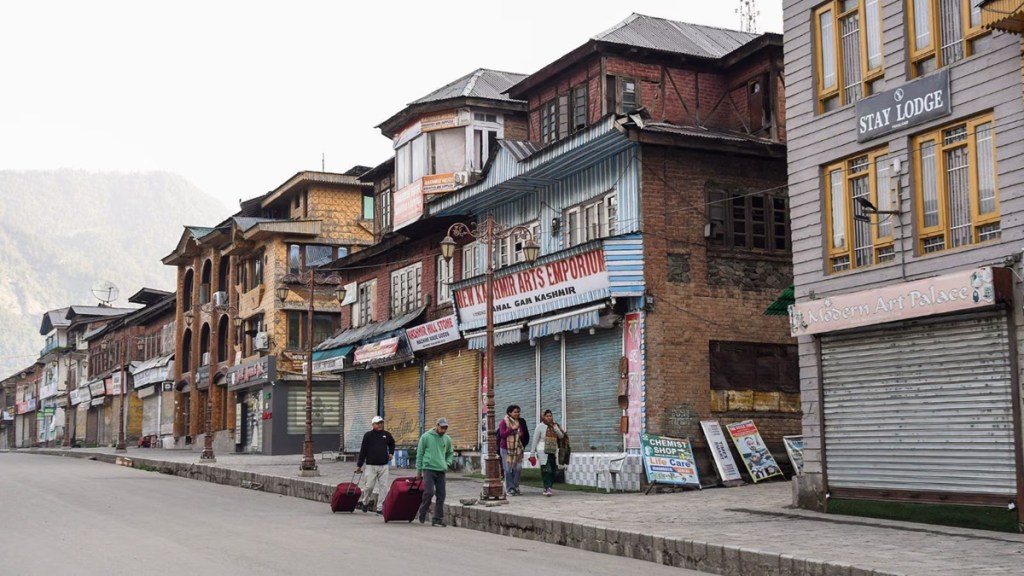The fatal terror attack in Pahalgam on April 22 has cast a shadow over everyday life in the valley, bringing back anxieties that had slowly receded over time. A palpable sense of unease has settled over the region with reduced footfall in tourist hubs. The attack has unsettled the steady return to normalcy, reviving an atmosphere of caution and concern as the attack claimed the lives of 26 civilians. The tragedy has left people grieving and business communities anxious, especially as it comes just ahead of the Valley’s peak tourist season.
The immediate effect on tourism-dependent segments is stark – drivers, guides, artisans, hotels, restaurants, and small business owners who are grappling with booking cancellations and lost income.
While the government has slapped a slew of diplomatic and trade-related measures on Pakistan in response to the attack, the business stakeholders in the Valley are focusing on the immediate need for peace and the rebuilding of public confidence with security for the lives of people.
“With the government support, I’m sure we will have the trade and business back but as of now we are in a state of shock. We are more concerned about the loss of lives,” Javed Tenga, President at the Kashmir Chamber of Commerce and Industry (KCCI) told FE Aspire.
Kashmir’s tourism sector, a key driver of the region’s GDP and employment, is shouldering the heaviest impact of the attack. Tourism has a special place in the economy of J&K which has been given the status of industry recently to attract investment. J&K had recorded 2.36 crore tourist visits during 2024 — the highest ever. This included 65,452 foreign tourists, 5.12 lakh yatris for the Amarnath Yatra and 94.56 lakh yatris for the Mata Vaishno Devi shrine.
Gowhar Maqbool, President at the Kashmir Hotel and Restaurant Association (KHARA) which has around 1,200 members, mostly hotels, said it is difficult to explain how hotels will survive in the next few months at least. The biggest casualty, said Maqbool, will be the staff for hotels as this was the beginning of the season for tourists to visit Kashmir.
The impact is not confined to Pahalgam.
“The situation is grim across the valley. We all were ready for tourists. Today we are already in some kind of debt, whether for expansion, upgrade, new investments, etc, and the season was supposed to help us in paying our debts but now we are feeling burdened,” Maqbool told FE Aspire.
The impact of the attack is apparent. According to a survey by online community platform LocalCircles, with 21,000 responses from 361 districts, 62 per cent of families with travel or pilgrimage bookings between May and December this year are cancelling their plans.
Other stakeholders of the vibrant tourism sector in Kashmir also understand the impact while the loss of lives remains the centre of their grief and agitation.
“While trade and travel bodies will continue to promote Kashmir but the challenge will remain for the coming few months. Our peak tourism season begins around March 15 and ends by June and we had significant bookings which are now cancelled,” Farooq Kuthoo, Former President, Travel Agents Association of Kashmir (TAAK) told FE Aspire.
For local business owners, the impact is both emotional and economic. Faisal Simon, who had plans to construct a guesthouse in Srinagar, said his Rs 50 lakh investment is stalled. “I had the permissions and materials ready. But everything is on hold,” he told FE Aspire.
Simon, who also operates an events and media production business, noted a steep decline in client queries. “We had enquiries for ad films and events, all of which are now withdrawn. My mother runs two home stays—those bookings are gone too.” His family also runs a business dealing with agricultural products such as honey, spices, and dry fruits, which are closely tied to tourist demand. “The next six to seven months are crucial.”
The business community in Kashmir is now urging the administration the provide security assurances for the safety of life and economy. “We need a unified message that we all including the government, residents, and businesses, are on the same page to collectively ensure the safety of people and promote peace. Business will follow if there is peace and security,” said Maqbool.
As tourism remains both a vital economic driver and a reflection of public confidence, the weeks ahead will be pivotal. The prospects for business recovery hinge not just on policy interventions but also on the region’s ability to restore a sense of safety.

